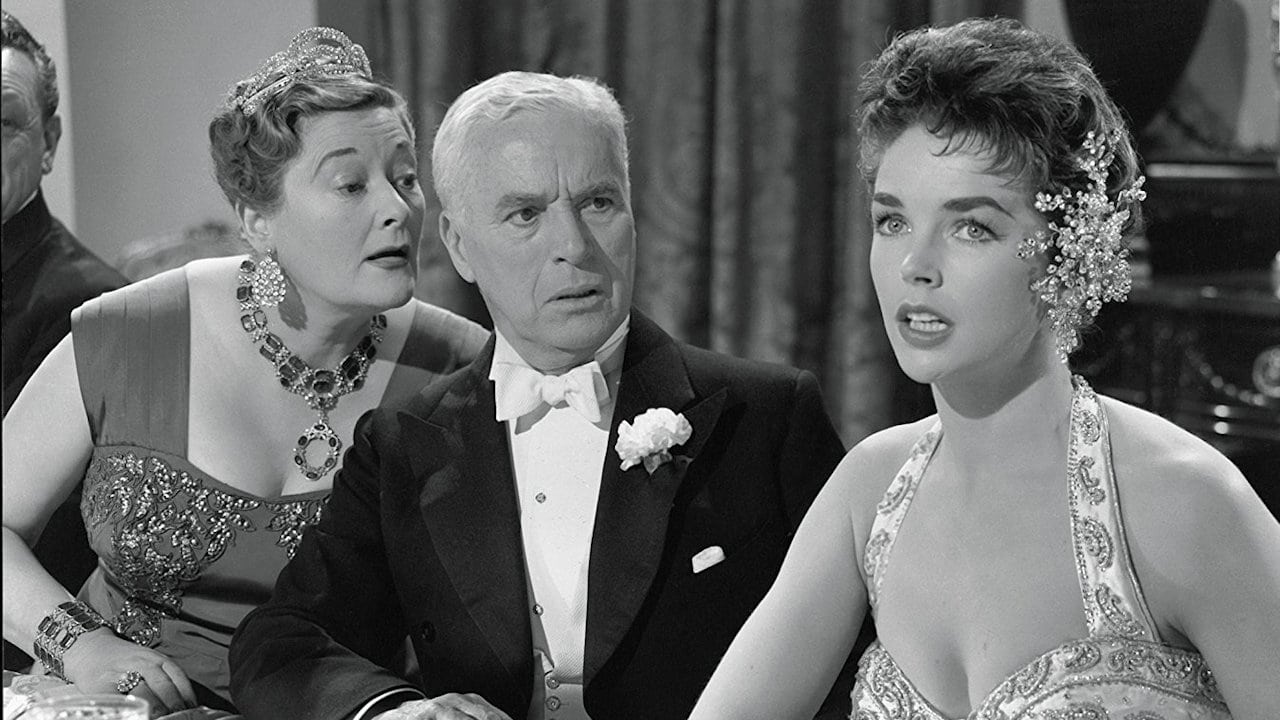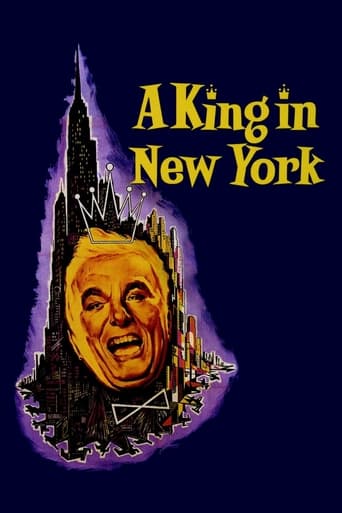



Intense, gripping, stylish and poignant
I cannot think of one single thing that I would change about this film. The acting is incomparable, the directing deft, and the writing poignantly brilliant.
View MoreThere are moments that feel comical, some horrific, and some downright inspiring but the tonal shifts hardly matter as the end results come to a film that's perfect for this time.
View MoreThis is a gorgeous movie made by a gorgeous spirit.
View MoreIt had been over 20 years since Charlie Chaplin last adorned his beloved character 'The Tramp.' Although in his later performances, the aspects of the icon are inescapable, A King In New York deliberately brings the slapstick back into an interesting context. He is not a tramp, nor a barber, but a king. A king whose unfortunate attempts at sophistication end up humiliating. It's a clear critique on the buffoonery of authority figures as he obliviously goes out for entertainment in New York while his home country is rioting against him. The lure of celebrity is a temptation to all and Chaplin protests that it's irresponsible for these types of powerful figures to be drawn to it. His last two films, The Great Dictator and Limelight, were two of his best films that were seamlessly able to blend comedy with a message and emotion.Unfortunately, A King In New York doesn't have the same weight to it emotionally and leads it inevitably into being lesser Chaplin. That said, it's still hilarious, with great satire and slapstick, a highlight being where the king's curiosity gets the better of him and he puts his finger in a fire hose and drags it through the following scenes. Chaplin has always had a talent for getting the best out of a simple joke. It's a shame that he felt the need to have his political point on a soapbox in the form of a young child. It's distracting and feels unnecessary. The film's effect would've been far greater without it being spoken as Chaplin's king was enough to get the message. Although, in finally watching his unpopular films, they have made me realise how he has an unconditional place in my heart as all director, writer and performer.7/10
View MoreThe nice thing about film is sometimes time has a way of improving our outlook on once-failed films. Sometimes they're just ahead of their time like The King In New York. Charles Chaplin wrote, directed, produced, and starred in The King In New York as the deposed King Shahdov fleeing an imaginary European country. He makes his way to New York City where he is inundated by the excesses and inconveniences of American life. The film contains nice pot shots taken at modern American targets, such as commercialism, new technology, noisy nightclubs, plastic surgery, rock music, and perhaps even Edward R. Murrow's "Person to Person". However, I think Chaplin was aiming for a higher target than these: the individual compromising his values when forced to do so.It's well known Chaplin was forced out of the United States for good in 1952. Between then and the making of this film, the H.U.A.C. hearings took their toll on the entertainment industry and private individuals as well. It's no surprise then Chaplin focused on those aspects of society closest to his personal concerns. The film tends to waver a bit in its second half. This is largely due to the communist hearing/witch hunt subplot involving Chaplin's son Michael, who plays the son of suspected leftist school teachers. Chaplin at first plays the scenario semi-serious, but then when he actually becomes victimized himself, he plays the climactic scene for laughs. After seeing the boy broken by government officials, the king consoles him before returning to his own country, exasperated with American life.Clearly the film was ahead of its time. The public still had a sore spot for Chaplin at the time of its release, delaying its release in the United States some sixteen years. If the film had continued in its satirical vein during the second half of the film, it would have been more consistent in tone and in its focus. Instead we get an uneven film at the end, unsure of its focus. Shepperton Studios in England hampered Chaplin's normal creative process by limiting the shooting schedule. As a result, the film took only twelve weeks to shoot; where as, typically Chaplin would take up to a year to make a film previously. What happened to Chaplin in his last twenty-five years was unfortunate, and it's unfortunate for us he made only this film and one other before retiring for good. He composed the score for this film, (and the main theme is entitled The Sadness Goes On), and it's his last leading appearance in film. It's simultaneously entertaining and disappointing, and one wonders what Chaplin could have done with the material at his own studio had Shepperton not rushed it through production. **1/2 of 4 stars.
View MoreOf course, Charlie Chaplin is mostly remembered for non-speaking roles. A King In New York is a satire by Chaplin about his impressions of America. It is refreshing to see a movie that is critical of America. Chaplin plays a king of a fictitious eastern European country who is forced, due to a coup, to flee to New York City. Chaplin show his versatility as a talking actor by really sincerely getting down the mannerisms of a European monarch. He is an older man, but very charming. Soon, however, the king finds that his natural goodness and true compassion is exploited by commercialism and political opportunism. At first the king is entranced by America's freedom, but soon discovers that American is a brash society of loud big bands, and brash advertising and movies. When the king finds himself broke, he is used by a beautiful young woman (Addams) to do advertisements. Addams excellently plays the superficial American. She is always smiling, but ever criticizing about the monarchs age and lack of television persona. When he gets self-conscious, she says 'No, you're great. You just can't appear on TV with a sagging face'. She convinces him to get a face lift, but it ends up that his face is so tight that if he laughs, he will end up in the hospital. The evening after the face lift, he unfortunately goes to a club and is subjected to slapstick humor that literally forces him to go back for emergency surgery.The movie's only flaw is that at times it gets a little dull. Other than that it is a brilliant look at America - where image and appearance are everything. The climax of the movie deals with McCarthyism. For dare helping out the child of disgraced communists (the child played by Chaplin's real life son), the king is forced before the Committee On UnAmerican Activities. The conclusion of the movie is very funny. In conclusion, this movie displays the full range of Chaplin's great talents. His comic touch, his dramatic-ism, his political satire, his slapstick gifts, and his kind demeanor are fully displayed in this film. I highly recommend this film.
View MoreI am pleased to find I'm not the only reviewer who thinks this film is an overlooked part of the Chaplin filmography. It contains some very pungent observations on the American way of life and American society which are still relevant today.Apart from popular culture and materialism, Chaplin takes very careful aim at the "Reds under the bed" hysteria of the 1950's (the equivalent of this century's "war on terror"). He tells the story through the character of a young boy whose parents are charged with contempt by the HUAC. When the boy goes on the run and finds shelter with King Shahdov he is collected by an apparently kindly and fatherly law officer. Later, however, we see him put under enormous psychological pressure to name his parents' friends (the so-called "fellow travellers").The boy's final appearance is very moving. His school superintendent says "how well" Rupert is doing. All we see is someone whose spirit has been broken, and who is tormented by guilt and shame - all in the name of the Land of the Free.This film is very well worth watching, and not just in the context of its own times.
View More